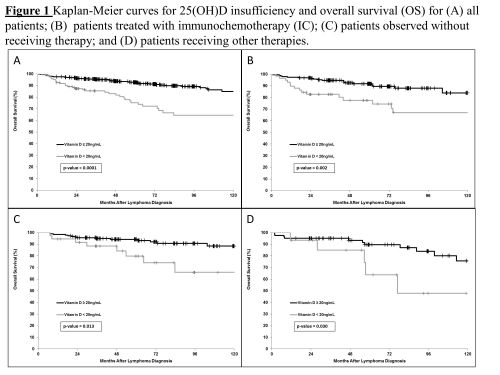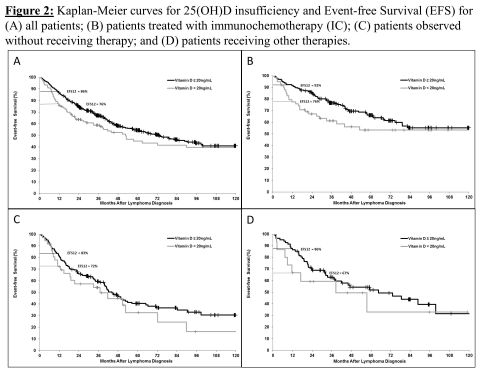6 februari 2017: Bron: ASH december 2016
Bij lymfklierkankerpatiënten met een zogenoemd indolente vorm - non-Hodgkin, die ook een vitamine D tekort bleken te hebben, blijken de standaard behandelingen met chemo combinaties minder goed te werken en had een negatieve invloed op ziektevrije tijd, progressie vrije tijd en overall overleving in vergelijking met lymfklierkankerpatiënten die wel normale vitamine D waarden hadden. Dit blijkt uit een 10-jarige studie onder 624 nieuw gediagnosteerde lymfklierkankerpatienten stadium 1-3 in de periode van 2002 tot 2012. Het vitamine D tekort werd als onvoldoende gezien bij de grens van 25-hydroxyvitamine D [25(OH)D] < 20 ng/mL. De studie werd gepubliceerd op de ASH in december 2016 in San Diego.
Hier twee grafieken. Grafiek 1 gaat over de overall overleving en het effect van vitamine D tekort bij alle patienten en ook vergelijkend tussen die wel en geen behandeling kregen.
Grafiek 2 laat de vergelijking zien van progressievrije tijd en ziektevrije tijd.
Resultaten:
De gemiddelde leeftijd bij de diagnose was 60 jaar (range 23-93); 19% van de patiënten had een vitamine D tekort (VDI). Mediane follow-iup periode was 59 maanden (range 1-144), met 297 recidieven en 78 doden (42 sterfgevallen direct gerelateerd aan de ziekte). De behandelingen waren inclusief immuuntherapie plus chemo (IC) (N=252), observatie - wait ands see beleid (N=218), alleen rituximab als behandeling (N=76), of andere behandelingen (N=96).
- Overall overleving (OS) en ziektevrije tijd (EFS zien we in de grafieken hierboven in figures 1 en 2.
In de volledige studiegroep vitamine D tekort werd geassocieerd met een mindere ziektevrije tijd (OR=2.05; 95% CI 1.18-3.54), OS (HR=2.35; 95% CI 1.37-4.02), en LSS (HR=2.97; 95% CI 1.52-5.80). - In de IC subgroep, VDI was geassocieerd met een mindere ziektevrije tijd (EFS) (OR=3.00; 95% CI 1.26-7.13), OS (HR=2.86; 95% CI 1.39-5.85), en LSS (HR=2.96; 95% CI 1.29-6.79).
- Een tekort aan vitamine D (VDI) werd geassocieerd aan een mindere overall overleving (OS) bij patiënten die in een wait and see beleid - observatie zaten (HR=2.25; 95% CI 1.20-6.76) of andere behandelingen kregen (HR=3.06; 95% CI 1.01-9.24).
- Een tekort aan vitamine D werd geassocieerd maar niet statistisch significant aan een mindere ziekte vrije tijd (EFS) bij de patiënten in observatie (OR=1.71; 95% CI 0.70-4.17) of die andere behandelingen ontvingen (OR=2.31; 95% CI 0.41-13.07), met weinig krachtig bewijs voor die associaties; LSS kon niet worden gemeten omdat er geen sterfgevallen waren.
- Er waren (N = 10) recidieven en (N=5) doden in de R-monotherapie groep op moment van de analyse.
Conclusie:
De onderzoekers concluderen:
We confirm previous findings that vitamin D insufficiency is associated with adverse long-term prognosis among patients with FL treated with IC, and extend these findings to patients who are initially observed or treated with other therapies. For the first time, we observed an association of vitamin D insufficiency with early clinical failure, suggesting a potentially modifiable factor to address in this subset of patients with poor outcomes. Whether treating VDI improves outcomes in FL warrants assessment.
Het abstract van de studie: Vitamin D Insufficiency Is Associated with an Increased Risk of Early Clinical Failure in Follicular Lymphoma staat hieronder zoals dat gepresenteerd werd op de ASH in december 2016 in San Diego
Vitamin D Insufficiency Is Associated with an Increased Risk of Early Clinical Failure in Follicular Lymphoma
Vitamin D Insufficiency Is Associated with an Increased Risk of Early Clinical Failure in Follicular Lymphoma
Program: Oral and Poster Abstracts
Type: Oral
Session: 623. Mantle Cell, Follicular, and Other Indolent B-Cell Lymphoma—Clinical Studies: Novel Therapy and Prognostic Markers in Follicular Lymphoma
Background: Vitamin D insufficiency (VDI) has been associated with inferior outcomes in patients with follicular lymphoma (FL) treated with chemotherapy and an anti-CD20 monoclonal antibody (immunochemotherapy; IC), but whether this association holds for other FL treatment strategies is not known. Furthermore, the subset of FL patients who experience clinical failure (progression, treatment failure) within 12 months of diagnosis have an inferior outcome compared to those achieving event-free status at 12 months (EFS12). We tested the hypothesis that VDI is predictive of early clinical failure (failure to achieve EFS12), overall survival (OS), and lymphoma-specific survival (LSS) among FL patients overall and in subgroups who were initially observed, treated with IC, rituximab monotherapy, or other therapies.
Methods: We evaluated this hypothesis in a prospective cohort study of 642 newly diagnosed patients with grade 1-3a FL enrolled from 2002-2012 in the Molecular Epidemiology Resource of the Iowa/Mayo Lymphoma SPORE. Serum 25-hydroxyvitamin D [25(OH)D] was measured by liquid chromatography-tandem mass spectroscopy, and VDI was defined as serum total 25(OH)D <20 ng/mL (per Institute of Medicine criteria) determined within 120 days of diagnosis. We used logistic regression to estimate Odds Ratios (ORs) and 95% confidence intervals (CIs) and Cox regression to estimate hazard ratios (HRs) and 95% CIs. We adjusted for FLIPI, body mass index, and month of blood draw; for the full cohort, we additionally adjusted for treatment.
Results: The mean age at diagnosis was 60 years (range 23-93); 19% of patients had VDI. The median follow-up period was 59 months (range 1-144), with 297 events and 78 deaths (42 due to lymphoma). Treatment included IC (N=252), observation (N=218), rituximab monotherapy (N=76), or other (N=96). OS and EFS curves are shown in figures 1 and 2. In the full cohort, VDI was associated with inferior EFS12 (OR=2.05; 95% CI 1.18-3.54), OS (HR=2.35; 95% CI 1.37-4.02), and LSS (HR=2.97; 95% CI 1.52-5.80). In the IC subset, VDI was associated with inferior EFS12 (OR=3.00; 95% CI 1.26-7.13), OS (HR=2.86; 95% CI 1.39-5.85), and LSS (HR=2.96; 95% CI 1.29-6.79). VDI was associated with inferior OS in patients who were observed (HR=2.25; 95% CI 1.20-6.76) or received other therapies (HR=3.06; 95% CI 1.01-9.24). VDI was positively but not statistically significantly associated with inferior EFS12 in the patients who were observed (OR=1.71; 95% CI 0.70-4.17) or received other therapies (OR=2.31; 95% CI 0.41-13.07), with low power for these associations; LSS could not be estimated due to lack of deaths. There were too few events (N=10) and deaths (N=5) in the R-monotherapy group for analysis.
Conclusions: We confirm previous findings that vitamin D insufficiency is associated with adverse long-term prognosis among patients with FL treated with IC, and extend these findings to patients who are initially observed or treated with other therapies. For the first time, we observed an association of vitamin D insufficiency with early clinical failure, suggesting a potentially modifiable factor to address in this subset of patients with poor outcomes. Whether treating VDI improves outcomes in FL warrants assessment.
Disclosures: Ansell: BMS, Seattle Genetics, Merck, Celldex and Affimed: Research Funding. Nowakowski: Celgene: Research Funding; Morphosys: Research Funding; Bayer: Consultancy, Research Funding.
Gerelateerde artikelen
- Studiepublicaties van niet-toxische middelen en behandelingen uitgesplitst in aparte lijst gerelateerd aan specifiek lymfklierkanker - non-Hodgkin en vormen van leukemie uit literatuurlijst van arts-bioloog drs. Engelbert Valstar
- Bremachlorofyl - radachlorofyl vermindert bijwerkingen bij chemo en verbetert kwaliteit van leven van lymfklierkankerpatienten - Ziekte van Hodgkin na 8 weken gebruik.
- Vitamine D (calcitrol 3x daags) vanaf stamceltransplantatie verbeterde twee jaar recidiefvrije overleving bij autologe stamceltransplantatie in vergelijking met placebo copy 2
- Vitamine D tekort bij lymfklierkankerpatienten - non-Hodgkin heeft negatieve invloed op effectiviteit van behandelingen en geeft kortere ziektevrije tijd en overall overleving
- Voeding- en voedinngstoffen bij lymfeklierkanker - Non-Hodgkin: Preventief effect van voeding en voedingsstoffen: Vrouwen die dagelijks voldoende hoeveelheden groenten en fruit eten verminderen de kans op lymfeklierkanker - non-Hodgkin. Dit blijkt uit de
- Zonlicht - vitamine D - beschermt tegen vele soorten kanker (25% tot 40%) waaronder lymfklierkanker - non-Hodgkin
- Aanvullende - complementaire - niet toxische aanpak van lymfklierkanker: een overzicht







Plaats een reactie ...
Reageer op "Vitamine D tekort bij lymfklierkankerpatienten - non-Hodgkin heeft negatieve invloed op effectiviteit van behandelingen en geeft kortere ziektevrije tijd en overall overleving"